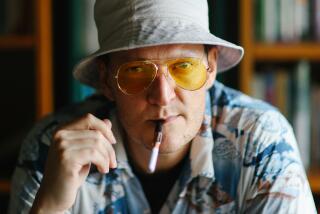Thompson Tries to Go From Last to First
- Share via
Ian Thompson will get to Blackheath, London, early today for the start of the ninth London Marathon because he wants to be sure of a bad position.
When the gun fires over the vast assembly of fun runners at the back of the field, the former Commonwealth and European champion will wait on the line until the last tail-coated waiter, pancake tosser and pantomime horse has trotted off towards Westminster. He will then attempt to overtake 20,000 people. It is his idea of fun.
Thompson intends to set a record and raise a tidy sum for charity, but today’s task is primarily part of a boosting up process before he concentrates his mind on serious business later this year.
He turns 40 in October, which gives him entry into the lucrative world of veteran running. The biggest money is available across the water in the United States, where the vets are known as Masters, and he has his eyes on the New York marathon in November, where the Masters winner stands to receive around 10,000 dollars.
He knows all about the other fish in this new pool, among them old friends and rivals such as Andy Holden, Tony Simmonds and Bill Rodgers; he knows a time of about 2 hours 15 minutes may be needed, 3 minutes faster than he managed in his last London run two years ago. “The tingle will be there,” he says.
Masters racing will be a bit like beginning afresh for Thompson. But only a bit. In the early 70s, this small, fast-moving body lit up the athletic firmament like a meteor.
He entered his first marathon--the AAAs Championships at Harlow--in 1973, to help out his club, Luton AC. Although he had never raced more than 10 miles competitively, he beat a field which included the Commonwealth champion, Ron Hill, in a time of 2:12:40, the fastest recorded for a marathon debut.
Three months later, at the 1974 Games in Christchurch, he took Hill’s Commonwealth title, beating both Hill and the world’s fastest runner, Derek Clayton of Australia. His time was 2:09:12, the second fastest recorded, and still the best in a major championship.
He won the Athens Marathon over the classic route. Then, on a cobblestone course in the tremendous heat of Rome, he won the European Championship. Another victory, this time in Finland, and it was time to take stock before the Montreal Olympics.
Jack Foster, the New Zealander who won silver behind Thompson in Christchurch, asked after that race: “What’s he going to do when he gets a bit of experience?”.
As it turned out, the bit of experience Thompson gained was that of failure. And what he did, as his brilliance burnt out, was become wise.
Having taken a year off, he was required to prove his form in 1976 at the Olympic trial race in Rotherham, where, the selectors decided, the first three would be chosen. Two weeks before the trial he caught a virus. “I didn’t have the nous to drop out like a lot of runnerse would now,” he said. He finished seventh.
Frank Shorter, the 1972 Olympic champion, said he had feared Thompson more than anyone. The British Olympic Assn. threatened to hold an extraordinary meeting Letters of support poured in to the Daily Mirror, and the launch was proposed of an ‘Ian Thompson must go to Montreal” fund, although quite what the fund was for . . .
The efforts were as fruitless as those made on Sebastian Coe’s behalf 12 years later. “Montreal was a big blow,” Thompson said. “I still feel that I could have got a medal of some kind.”
His star was fading. A bad run in the trials put paid to any hope of his retaining the European title in 1978. Two years later he reached the Moscow Olympics, but failed to finish.
Such disappointment, coming after such vivid achievement, would have crushed many athletes. Thompson has armed himself with the kowledge of experience. And carried on.
“I’m a typical nutter runner,” he said. “I’vw always put in more training than was good for me. And because I’m not a natural speed merchant I had to dig so deeply into my reserves to find that level of performance early in my career.
“But then it is is so difficult for any athlete to stay at a peak. Two to three years is pretty good. FOur to five is brilliant. Only very few, such as Coe, can stay at the top for 10 years.
“When I started I ran more or less like an African would, without a definite plan. But marathons get harder the more you do. Now I look at the Africans coming through and say ‘I know where you are. I know what plane you’re on.’ It’s nice to have actually been there and done it yourself.”
Out of Africa, dor out of Luton, runners chase the same thing. Ian Thompson, older, wiser, is still in pursuit.
More to Read
Go beyond the scoreboard
Get the latest on L.A.'s teams in the daily Sports Report newsletter.
You may occasionally receive promotional content from the Los Angeles Times.










